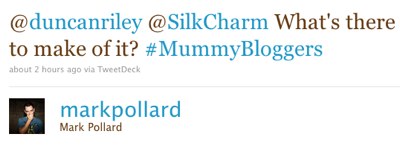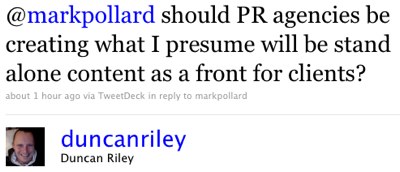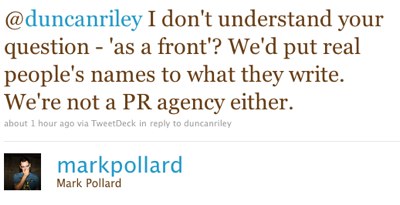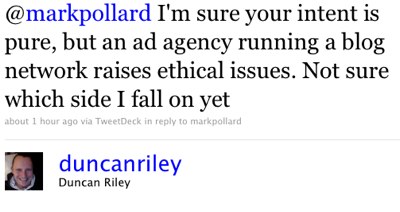Saw these ads on Problogger Jobs today (and yes, I read Problogger Jobs once every week or two: competitive intelligence 😉 )
Seeking Australian mum bloggers to write about what they love to write about
Freelance SEO-aware online copywriters, Sydney
Head content angler (suit editor, sub-editor), Sydney
All the jobs are for blog(s) coming out of McCann Worldgroup, a Sydney based “advertising, marketing and communications agency.”
It naturally tweaked my radar: what’s a marketing firm doing creating blogs.
This paragraph in particular caused the radar blip (emphasis is mine):
“We’re currently on the lookout for Australian mums (with kids under 10) who can write their socks off. We’re working with a variety of large companies on building great content-rich websites, many of which will focus on mums. ”
Now this isn’t a publishing company, this is a advertising, marketing and communications agency, a company that would normally place ads on other sites, not create sites, at least the sort they are proposing here.
So I turned to Twitter, and in particular to Laurel Papworth for a radar check. The thought was “am I reading too much into this?”

A little later Mark Pollard, the Strategy Director and McCann Sydney responds.

I responded in terms of the description of the site: note McCann states that they are “working with a variety of large companies on building great content-rich websites.” That line suggests that the sites are being made for the companies, not the sites being made for the inventory to sell to (one would presume) advertisers.

But apparently this doesn’t raise any alarm with Pollard, which in itself is interesting. I originally asked Laurel what she thought of it because I was looking to see both sides (and Laurel has a fine radar for these things), but the other side seems to be lost on Pollard.

Ah yes, putting “real names” to blog posts negates any relationship between the content they are writing, and the advertisers the site(s) have been set up for.
Sounds a little bit epic fail to me.
I could well be wrong, and if Pollard would like to share the editorial guidelines with me that show that there will be a clear separation between editorial and advertisers, I’ll cop that my radar is wrong.
Thing is: so far it doesn’t read that way.
Perhaps it’s not astroturfing, but we know what happened in the United States when the line between advertising and content blurred, don’t we.
Argue away in the comments, and try to convince me otherwise: as I last said to Pollard on Twitter:

And I mean that sincerely. But getting defensive in replies on what is a genuine interest in the ethical issues that could come into play here doesn’t endear confidence.











